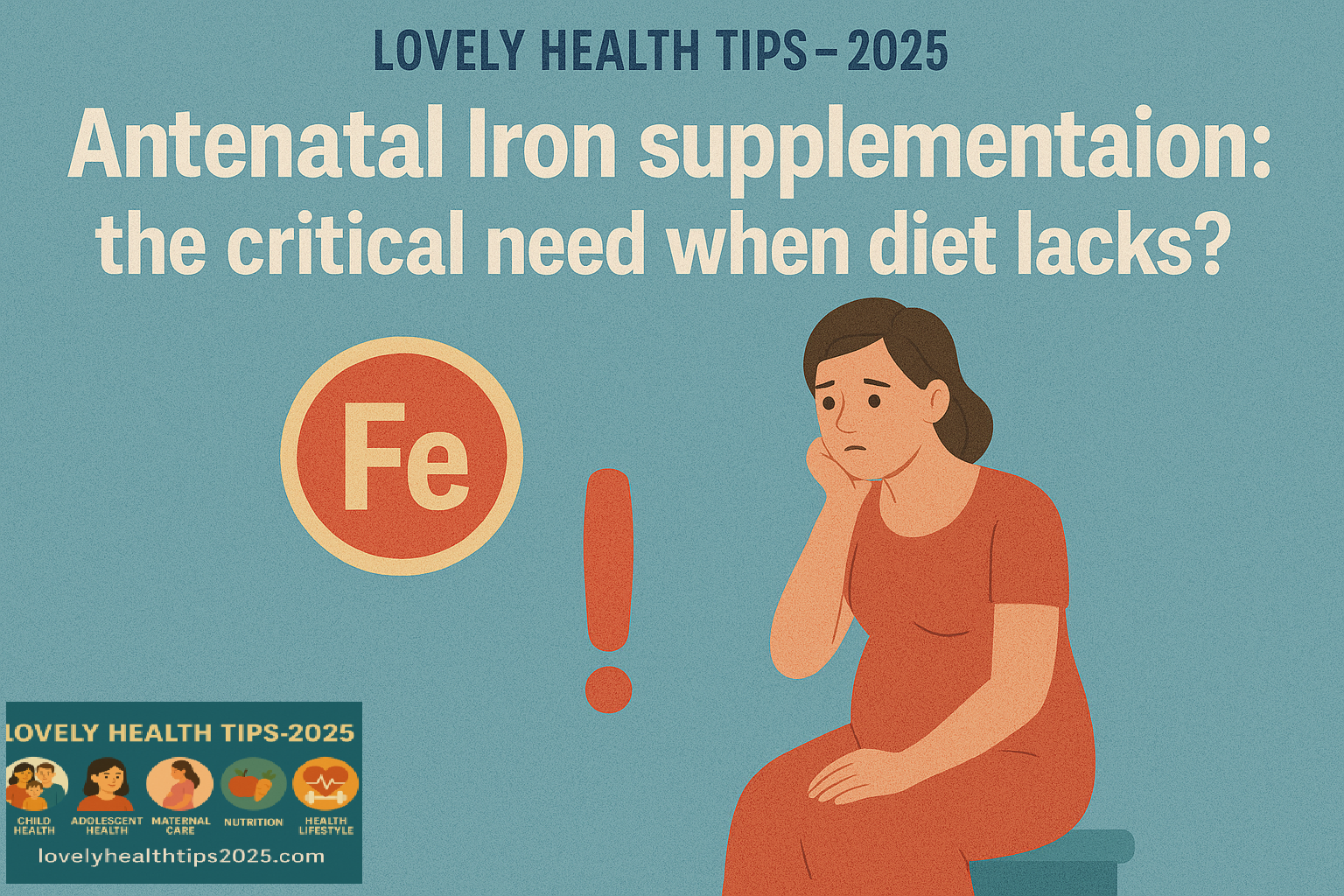Last Updated on October 21, 2025 by
Antenatal Iron supplementation: During the third trimester, a pregnant woman may lack iron and iron deficiency can actually negatively affect a child’s mental development.
Introduction
Mental Development of child mainly depends upon the Antenatal Iron supplementation of Pregnant Mother & it helps to increase the mental growth.
Good sources of Iron rich foods as follows:
 |
| Good source of Iron rich food |
Diagnosing and treating Antenatal Iron supplementation in pregnant women
As an essential trace element in the human body iron functions as the main substance in red blood cell proteins known as hemoglobin to transport oxygen through the bloodstream. A woman’s blood volume expands by approximately 50 percent across pregnancy as the body tries to accommodate the baby and gives rise to a higher demand of iron. Iron deficiency anemia can add some serious health implications to mother and baby, An iron deficient diet can cause it.
Odds of Pregnant Iron Deficiency
Maternal Complications:
- Anemia: Extreme iron deficiency can lead to anemia, which would produce signs and symptoms, from fatigue to dizziness, weakness and pale skin.
- Weakened Immunity: The immune system cannot be functioning properly without iron. They are more likely to develop infections if they are deficient, particularly pregnant mothers.
- Problems Related to the Heart: The heart beats faster or begins to palpitate in severe anemia as it struggles to deliver oxygen to the tissues of the body.
- After Child Birth Depression: If pregnant women are iron deficient they may face after birth depression, numerous publications were able to link pregnancy iron deficiency and its role in after child birth depression.
Fetal Complications & Antenatal Iron supplementation
- Preterm Birth: The low amounts of iron may also cause preterm birth that puts the child at risk of early birth.
- Infants born with low birth weight result from iron deficiency in mothers that restricts their fetal size during pregnancy.
- Developmental Delays: Iron plays a vital part in the developing of the brain. In offspring, maternal deficiency during pregnancy has been associated with poor cognitive and behavioral outcomes.
- Stillbirth: Severe anemia (in particular during pregnancy) can increase the risk of stillbirth in the extreme case.
Mother anemia due to iron insufficiency and requires Antenatal Iron supplementation
- Inappropriate Food Intake: Unwholesome eating of food not eating iron-containing food, and to some extent unhealthy eating habits might cause iron insufficiency.
- High Nourishment Demands, Fetus: The developing fetus needs plenty of iron and may rob the mother of her stores.
- There are gastrointestinal diseases, like celiac disease and inflammatory bowel disease which reduce the body’s ability to soak up iron.
- Blood loss: Heavy periods before pregnancy or bleeding during pregnancy can deplete iron.
Prevention & Management of Antenatal Iron supplementation:
Dietary Changes:
- The first step to avoid iron deficiency is choosing red meat, then poultry and fish, leafy greens, beans and lentils and iron-fortified cereals.
- Aim to include foods high in Vitamin C such as citrus and tomatoes, if you include foods rich in iron in your meals.
- We should not serve iron-rich meals together with calcium-rich food or drinks, as calcium stops iron from being absorbed.
Antenatal Iron supplementation:
Many health professionals often prescribe iron (e.g., ferrous sulfate, ferrous gluconate) to pregnant women.
- Many prenatal vitamins contain iron, however if the mother has Anemia, she may need to take more.
Regular Monitoring:
Physicians may find and manage iron deficiency early by testing a patient’s blood for hemoglobin levels.
- Providers have the ability to make proper dosages changes based on the observed outcomes of treatment.
- Getting to the main cause.
- Muscle problems can develop if your body doesn’t gain as much iron from your diet, so these problems should be treated.
- When a person has advanced anemia, experts may advise giving them injections of iron and blood transfusions.
Conclusion
Iron deficiency may be commonly found in pregnant mothers, but it is preventable & treatable. Maintaining a proper diet with all necessary nutrients, taking iron supplements when necessary, and regularly following up in the prenatal clinic, help achieve an adequately iron level through pregnancy. Ferrous deficit administration is crucial for each the mother and the infant in an effort to present higher being pregnant outcomes.
Link for
| Anemia treatment in Adolescents(10-19) & its Risk of Malnutrition |
FAQs:
Q1. What role does iron play for pregnant women?
Ans. The pregnancy requires iron to generate additional blood supply for both the developing baby and the mother. The nutrient helps transfer oxygen throughout the body while maintaining steady energy levels and functions to reduce anemia risk and other medical problems & Antenatal Iron supplementation
Q2. Women facing pregnancy need to know about the potential dangers that result from having insufficient iron amounts during their maternity period.
Ans. The development of a baby’s brain and body faces impediments while premature birth and maternal anemia and low birth weight become more likely when women suffer from iron deficiency.
Q3. Pregnant women usually display these signs when they lack iron in their system:
Ans. The symptoms of iron deficiency in pregnant women may manifest through intense fatigue combined with paleness of the skin and breathing difficulties and dizziness as well as rapid heart rate and difficulty concentrating.
Q4. Pregnant women should follow natural methods to receive adequate iron into their bodies.
Ans. One way for pregnant women to get more iron is to eat lean red meat, spinach, legumes, fortified cereals and dried fruits. If healthy pregnant women eat iron-rich foods and oranges or tomatoes, the vitamin C makes it easier for their bodies to absorb the iron.
Q5. What level of Antenatal Iron supplementation is necessary for a woman who is pregnant?
Ans. Antenatal Iron supplementation is necessary. Doctors recommend that pregnant women get 27 milligrams of iron daily, although the amount can change depending on their medical needs and blood work.
Q6. Do deficiencies in iron cause any problems in the baby’s postnatal health?
Ans. Women with iron shortages often give birth to babies whose iron reserves are very low and this may negatively affect their baby’s postnatal growth and health.
Q7. Pregnant women need to know whether they should take Antenatal Iron supplementation.
Ans. A doctor should help pregnant women decide on iron supplements, as too much iron is dangerous for the baby and can upset the stomach.
Guideline of WHO for Antenatal Iron supplementation and its link as mentioned below: https://www.who.int/data/nutrition/nlis/info/antenatal-iron-supplementation
Thanks and Regards
About the Author – “Mr. Bibhu Ranjan Mund”, Master in Public Health (MPH) from IIHMR University, Jaipur (Rajasthan) has experience of 18 years in Public Health activities. Through “Lovely Health Tips-2025”, we share the evidence & experienced based health & wellness guides with solutions for every day well-being. More from Author
Disclaimer
This information is suggestive only and not a replacement for medical advice. For more detail, please visit to my website as mentioned below:

